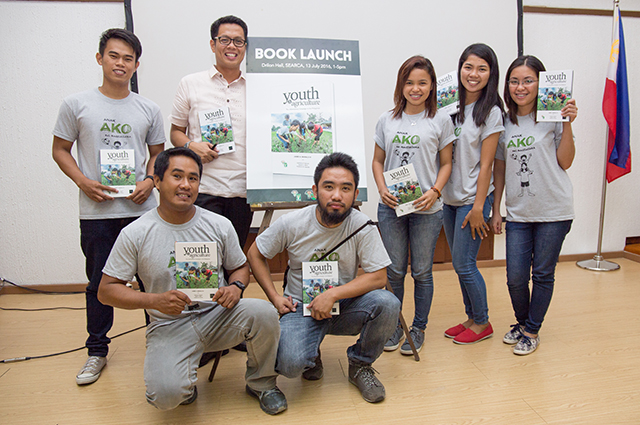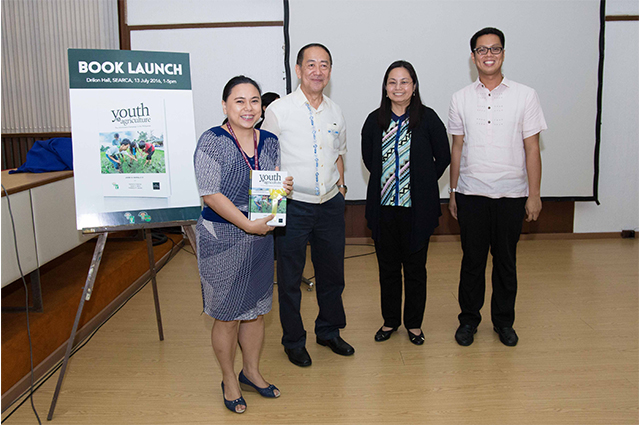Two development communication practitioners wrote their book review on Youth & Agriculture: The Infomediary Campaign in the Philippines launched at the Southeast Asian Regional Center for Graduate Study and Research in Agriculture (SEARCA) in Los Baños, Laguna, July 13.
 In a matter of 3-4 hr, the new book Youth & Agriculture: The Infomediary Campaign in the Philippines can help readers realize that young people, when empowered, can help create impacts in rural rice-farming communities alive.
In a matter of 3-4 hr, the new book Youth & Agriculture: The Infomediary Campaign in the Philippines can help readers realize that young people, when empowered, can help create impacts in rural rice-farming communities alive.
This book aims to guide and provide wisdom to development workers particularly the extension practitioners, students and professionals in involving the youth in agriculture, and raise curiosity among scholars to contribute significantly in improving current efforts in the field.
This is a product of more than three years of the Infomediary Campaign, an action research to engage young people as information providers in their respective rice-farming communities. It is an initiative of the Philippine Rice Research Institute (PhilRice) in collaboration with the Technical-Vocational Unit of the Bureau of Secondary Schools of the Department of Education (DepEd) and the CGIAR Research Program on Climate Change, Agriculture and Food Security (CGIAR-CCAFS).
Campaign team lead Jaime A. Manalo IV is the main author, with contributions from team members Katherine P. Balmeo, Jayson C. Berto, and Fredierick M. Saludez.
Going through the pages can offer a lot to a variety of readers.
Notably, the book is a strategic move to present and promote the campaign. Infomediary was introduced, including the issues that it seeks to address, and the major components and key activities.
It does not only speak to the stakeholders of the Infomediary Campaign. Anyone related to agriculture, rural farming communities, communication, and agencies can find the content enthralling because of the stories related to the campaign’s implementation. Also, both new and veteran field workers may find valuable insights in community field works that were disclosed in several chapters.
Further, accounts of what-went-well and what-went-wrong were documented. The best-fit practices from the implementers, schools, and other stakeholders were highlighted while glitches during campaign implementation were noted.
The contents were written on a serious note, yet there were excerpts that were light and entertaining. For instance, there were sections tackling useful research methodologies, implementation strategies, including field work tips that add up to the reader’s knowledge. On one hand, there were stories written in first person point of view, which can keep readers smiling and nodding at the stories they can relate with.
Meanhwile, discussions were aggressive. Dominant views and global statistics worked in two ways. These were used to corroborate the campaign’s results. Conversely, these were confronted to examine its certainty, which make readers contemplate.
Aside from good reads, the book is also full of interesting visual footages that complement written messages. The photos keep the stories alive in the reader’s mind and reflective of the campaign’s initiatives, while graphics are informative and entertaining.
All told, the book Youth & Agriculture: The Infomediary Campaign in the Philippines is more than a research journal. The book is a gift of knowledge that does not only tell readers about the campaign, but also inspires and helps people realize that with the youth, there is hope in agriculture.
Written by Anna Marie F. Bautista, development communicator at the Philippine Rice Research Institute.
Communication with a purpose
 Simple, yet collective efforts, can bring big changes to our society – this is the most remarkable realization that I’ve had after reading the book Youth & Agriculture: The Infomediary Campaign in the Philippines.
Simple, yet collective efforts, can bring big changes to our society – this is the most remarkable realization that I’ve had after reading the book Youth & Agriculture: The Infomediary Campaign in the Philippines.
As a development communication student, I am aware of the different problems and critical issues that our country is facing. Many of these issues are related to agriculture sector. The increasing population and the changing society call for a strong need to tackle relevant and timely issues such as food security. We need to involve ourselves in the discussion of these issues. In order to address these problems, we have to empower our stakeholders (the youth and the farmers), by giving them the right information that they need, and letting them know that they have the ability to find the right solutions to change their lives. This is what the book tells us.
I was very amazed by how the book was able to address the issues we often overlooked such as climate change, information poverty, and the increasing number of youth migration. It gives the readers a sense of involvement in these issues to come up with appropriate solutions.
Through this book, I realized that as rice consumers, we need to understand the processes and complexities of rice production. More importantly, as citizens of a rice producing country, we need to act and involve ourselves in the efforts to achieve rice sufficiency and ensure food security in the Philippines.
The stories of the Informediary team were honest and very inspiring. Honest, in such a way that they discussed the limitations of the campaign, the inevitable dilemmas that they encountered along the way, and the mistakes that they did while they were implementing it. The stories and experiences that they shared in this book made me understand how communication can really improve the lives of people. Indeed, communication and determination should go hand in hand.
As a development communication student, I find this book very helpful in my studies. I was able to understand how the concepts in DevComm are used in real life. The book also discusses the different methods in data gathering, practical tips in doing field work, how to behave in rural areas, how to work with different stakeholders, and other necessary lessons that every communication practitioner should know. It helps us understand the role of communication and its theoretical and practical applications.
I highly recommend this book, especially to my fellow development communication students. This will be a very helpful tool for us in doing our researches, writing stories, and empowering our intended audience. This book is a tangible evidence and a reminder to us that no matter how big or small our effort is, if we do things with purpose and with a heart, it will lead us to the kind of development that we are aiming for.
Written by Donna Cris P. Corpuz, BS Development Communication student from the University of the Philippine Los Baños.




